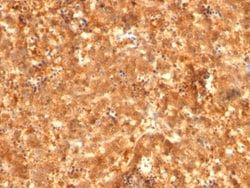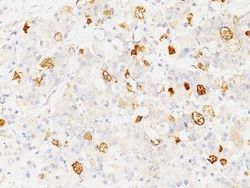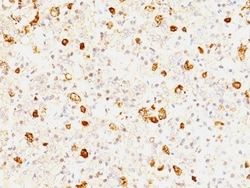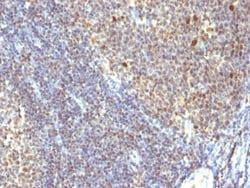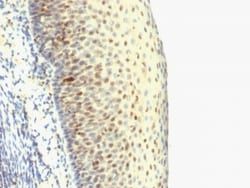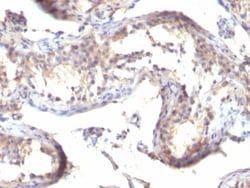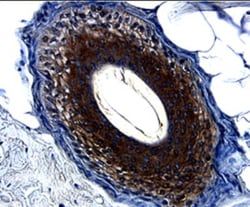TGF-alpha Antibody (TGFA/1119), Novus Biologicals™
Mouse Monoclonal Antibody
Manufacturer: Fischer Scientific
The price for this product is unavailable. Please request a quote
Antigen
TGF-alpha
Concentration
0.2mg/mL
Applications
Flow Cytometry, Immunohistochemistry (Paraffin), Immunofluorescence
Conjugate
Unconjugated
Host Species
Mouse
Research Discipline
Angiogenesis, Cell Cycle and Replication, Signal Transduction
Formulation
10mM PBS and 0.05% BSA with 0.05% Sodium Azide
Gene Alias
protransforming growth factor alpha, TFGA, transforming growth factor, alpha, transforming growth factor-alpha
Gene Symbols
TGFA
Isotype
IgG1 κ
Purification Method
Protein A or G purified
Test Specificity
This antibody reacts with the C-terminus of TGF alpha and shows no cross-reaction with EGF and the neuropeptide synenkephalin. TGF alpha (aa50) is a growth factor with 33% homology to EGF, binds to EGFR, activates tyrosine phosphorylation of the receptor, and stimulates cell proliferation. It plays a role in tumor initiation by inducing the reversible transformed phenotype.
Clone
TGFA/1119
Dilution
Flow Cytometry 0.5 - 1 ug/million cells in 0.1 ml, Immunohistochemistry-Paraffin 2 - 4ug/ml, Immunofluorescence 1 - 2 ug/ml
Classification
Monoclonal
Form
Purified
Regulatory Status
RUO
Target Species
Human
Gene Accession No.
P01135
Gene ID (Entrez)
7039
Immunogen
Recombinant human full-length TGF alpha protein
Primary or Secondary
Primary
Content And Storage
Store at 4C.
Description
- Ensure accurate, reproducible results in Flow Cytometry, Immunohistochemistry (Paraffin), Immunofluorescence TGF-alpha Monoclonal specifically detects TGF-alpha in Human samples
- It is validated for Immunohistochemistry, Immunohistochemistry-Paraffin.

